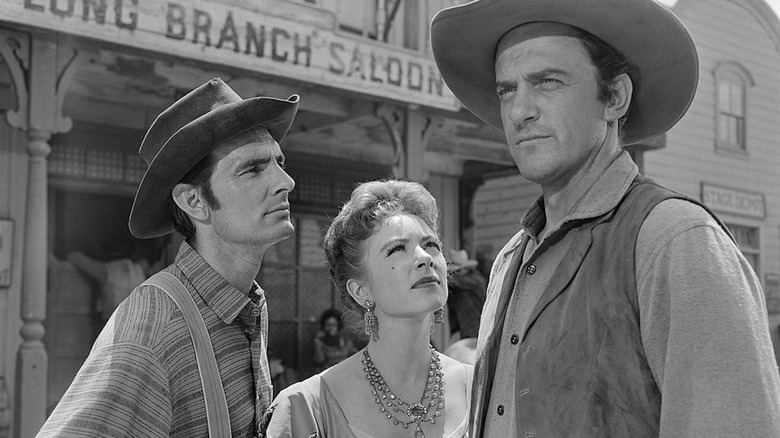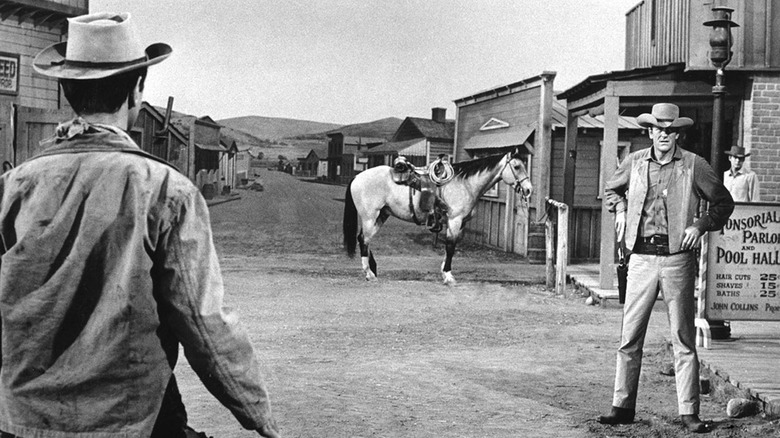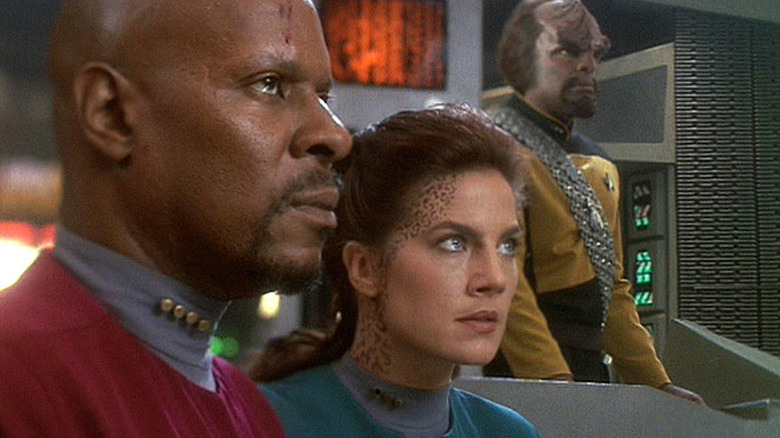The Classic TV Western That Inspired Star Trek: Deep Space Nine
Prior to creating "Star Trek," Gene Roddenberry had spent a decade as a TV journeyman, writing for multiple hit shows of the day including "Highway Patrol," "I Led 3 Lives," "Dr. Kildare," and 24 episodes of "Have Gun – Will Travel." He became adept at multiple genres and had a very good sense of how TV trends flowed by the time he went to pitch "Star Trek." Famously, Roddenberry pitched his sci-fi show as "Wagon Train to the Stars," referring to the massive hit Western that debuted in 1957 and ran until 1965. That notorious pitch has worked its way into known Trek lore and can be heard quoted by good Trekkies everywhere. These days, "Star Trek" is far more popular than "Wagon Train" ever was.
Looking over "Star Trek," one finds a lot of Western-inflected language, notably how space is referred to as the Final Frontier. While Roddenberry wanted to pointedly avoid any notions of American colonialism — Trek's Prime Directive is an anticolonialist measure — he still was hooked on the notion of American frontiersmanship. Many Trek writers and creators ever since have fallen back on a lot of those old Western ideals.
Indeed, in the oral history book "The Fifty-Year Mission: The Next 25 Years: From The Next Generation to J. J. Abrams," edited by Mark A. Altman and Edward Gross, the makers of "Star Trek: Deep Space Nine" explained that their new show was meant to resemble another classic Western TV show, namely "Gunsmoke," the Dodge City-set radio and TV series that ran in one medium or another from 1952 to 1975. Notably, the titular Deep Space Nine was to be the space station where everyone inevitably stops, very much the same way everyone passes through Dodge City.
Dodge City, Deep Space
There is, of course, a central error with "Deep Space Nine," in that its main setting isn't actually in deep space. It's right next to the planet Bajor and experiences high foot traffic.
"Gunsmoke," in addition to a long life as a TV series (now second-longest running behind "The Simpsons"), returned in the 1980s and '90s as a series of TV movies. The legacy and popularity of "Gunsmoke" shouldn't be understated. The TV series starred James Arness (taking over from the radio show's William Conrad) as Marshal Matt Dillon, and followed his adventures overseeing Dodge City's rampant lawlessness in the 1870s. It was not a wild adventure show, but a heady drama, often infused with a downbeat, almost tragic tone. Dodge City, it seemed to communicate, was not a pleasant place.
The same might be said of Deep Space Nine. It was not a bright, clean cruise ship like the Enterprise-D from "Star Trek: The Next Generation," but a broken down, cramped dive, loaded up with criminals and ex-freedom fighters. One of the show's directors, Winrich Kolbe, pointed out the parallel between the two shows, saying:
"'Deep Space Nine' is 'Gunsmoke.' It's the town that everybody comes to. Get the characters in there. That's actually the selling point, and because of its setting, it became more of a character show. We had people in there that represented different opinions. We didn't have to schlep through some deserted canyon in order to get there, they had to come to us."
At the time, many Trekkies were uncomfortable with that "come to us" attitude, as the show is called "Star Trek" and would feature little in the way of trekking. So there was no trekking and it wasn't in deep space. Eventually, though, fans warmed up to the series.
Westerns vs. sci-fi
One of DS9's writers, David Weddle, expanded the comparison to "Gunsmoke" into a broader observation about genre; sci-fi and Westerns, he said, are closer than one might think:
"This genre does have a lot in common with Westerns. I didn't realize it when we first started on 'Deep Space Nine,' but I came to realize it because I brought up Westerns all the time in the writing room as analogies for whatever we were working on. And the fact is that they are both allegorical forms of storytelling. The American Westerns, they exist in a sort of imagined world. It's not exactly what the West is like."
Fair point. Westerns idealized history, while Roddenberry idealized the future. Only on "Deep Space Nine," that ideal future was now showing its cracks; what happens when a utopian organization like Starfleet buts up against war atrocities or corrupt theocracies? Can the idealism hold? And, like in "Gunsmoke," no one in "Deep Space Nine" can fall back on a higher authority figure; the law ends with them. Weddle said:
"They're mythic storytelling, and it's very much like outer space, because you have people going across an uncharted wasteland where there is no rule of law, no civilization, and they have to face existential choices about what choice am I going to make here for myself? What am I going to decide is right or wrong? And there's no authority to tell me or guide the way. They're stripped-down morality tales."
Which is where, of course, Trek most excelled. When "Deep Space Nine" was a series of weekly morality plays, it was at its best. Fans of "Gunsmoke" might want to chime in to say if the comparison is apt.


